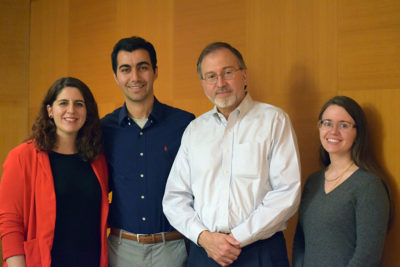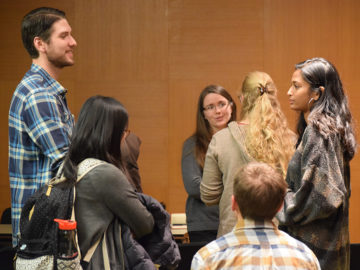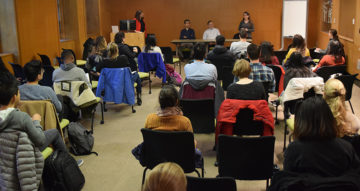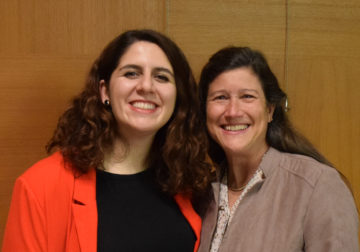Careers in… Industry

N. Akbari, E. Nemati, K. Goklen, and B. Cooper
Organized in concert with the Engineering Graduate Student Association (EGSA), Careers Beyond Academia held a discussion to explore careers in industry featuring panelists Bailey Cooper, PhD’16 biomedical engineering; Ebrahim Nemati, PhD in electrical engineering from UCLA, and Cornell chemical engineering alumnus Kent Göklen, PhD, MIT. The speakers shared the pros and cons of working in this environment, and how they transitioned from academia. Participants brought their own questions which were discussed throughout the session. Moderated by Najva Akbari, PhD candidate in applied engineering and physics who also invited the speakers through a request for funding from Careers Beyond Academia, the panelists addressed many common questions and gave frank advice from their personal experiences on several tricky topics.
 After brief introductions, the discussion delved into the top question on everyone’s mind: what are the differences between working in industry compared with academia?
After brief introductions, the discussion delved into the top question on everyone’s mind: what are the differences between working in industry compared with academia?
Industry vs. Academia
Whereas in academia there is greater perceived autonomy, longer term horizons, and small collaborator groups, industry teams tend to be larger, are composed of a much more diverse background of disciplines, and operate under strict deadlines. It is important to note, the speakers agreed, that there is a big difference along the spectrum of research and development. Even in research in industry, employees are always encouraged to have the bottom line in view. In an industry position, all three speakers encourage, “be sure to engage yourself with more than just the ‘R’ in R&D.”
One attendee voiced a common career consideration: whether or not to stay in academic research, and a desire to do research in industry. Ebrahim Nemati shared, “Research problems are more ‘real’ in industry: there has to be more than a correlation (which is sufficient for academic research), it’s got to work in a product. It’s important to keep that in mind, that it has to work in a field environment. This took me some getting used to.” Kent Göklen cautions, “Look at the percentage of ‘R’ vs ‘D’ at the company you are considering joining, and ask yourself, is that emphasis aligned with your interests? It’s a good time to get into the research side when the economy is going well, but this side is often cut during downturns.”
Industry pays well, too…but the audience was well aware of this fact, as indicated by the universal chuckles.
What skills are needed to be successful in industry?
“Skills I learned during the PhD, like data analysis are key,” said Bailey Cooper. “You tend to become an expert in one narrow area, so learn how to teach yourself new technologies, know how take steps to solve a problem.” She also cited the importance of learning about team toolboxes to facilitate working on a team, which is essential in her work at Regeneron.
Nemati chimed in, “self motivation is as critical as being able to fix instruments.” In addition, “generally there is no training in your PhD to learn good communication, the workplace culture.” He cited the importance of his internship at Samsung during his PhD which taught him these skills, while letting him test-drive a company he was thinking of working for after graduation.
Having just completed her own internship at Intel this summer, Najva Akbari lauded Cornell’s professional development through Careers Beyond Academia that routinely offers programming for better communication both to lay audiences (COMM 5660) and to specialists outside of your field of research (Finding Your Research Voice).
Nodding, Göklen stressed both the need to adapt to working on deadline, and especially communicating with people who don’t have a PhD.
What to look for in an internship and how to land a job
All three speakers were in alignment on the essential aspects to consider for an internship: Look for access to mentorship, be open to new projects. But how to find them? Call alumni! Finding a good fit is important to get training you seek, so discuss these aspects in your informational interviews. Each company has its own culture and global outlook. So opportunities to grow are mostly up to you to challenge yourself.
Ebrahim admitted it’s more difficult for immigrants. He recommends that eligible internationals apply for the green card during their PhD studies, and cited his use of the NIW (national interest waiver) program. In the end, “I applied for one job and was hired for another, so be open to the position description,” he added.
How does the size of the company affect your work?
“At large companies the list of contributors tends to be long, so you need to be humble,” Nemati said of his research outputs. “At large companies there are more layers. For instance, at Samsung sometimes the project I’d worked on for months got killed from the top.” So you have to be ready and flexible to change topics to stay relevant. He added, “I haven’t met anyone in industry who says ‘I love the meetings’…” which are prevalent in any company.
Cooper added, “At a more junior company there is more setting up, developing the resources to put in place.” She cited learning a lot outside of the science in her first six months at Regeneron, even though she had acquired a larger skill set while on research faculty at Virginia Tech.
When asked if it’s a good idea to modify what your research is for your PhD if want to go into industry, Göklen replied “it can be hard to find opportunities if you are pigeon-holed into a narrow field, so look for opportunities to broaden your scope, and also how to explain your work in a broader context. In any case, at GSK for some specialized areas like downstream processing we know it is difficult to hire experts right out of school, so we are looking for talented students with transferrable skills, and expect you’ll have to do a lot of on-the-job learning in your first year or two.” Cooper added, “I wish someone at my Regeneron interview was on my thesis committee; they asked great questions about my research.”
How can you tell if there’s growth in a particular research area?
Growth projections in different sectors can be gleaned from market reports. It’s good to read company annual reports prior to your interview because it will enable you to ask better questions. Kent Göklen added, “When comparing companies, you might want to look at what percent of the budget is spent on R&D, to get an idea of how the company prioritizes these activities relative to their peer companies,” which is more informative than the exact numbers.
See the Careers Beyond Academia LibGuide
Right now, hot areas of research are in gene therapy and CAR T cells, for instance. Data scientists are in demand. Know how to search for upcoming hot topics-you can take advantage of the business library at Cornell. Cooper added, “Fierce Biotech is a resource for you to know what skills companies are looking for, and can be an indicator of up-and-coming areas of research.”
What is the currency of success?
You have time in academia. You have money in industry. Time is precious, and you can work with colleagues to use equipment. You might run experiments in parallel, so much more planning and time management is needed in industry. Cooper was amazed at the increased pace in industry where she found herself simultaneously planning, rerunning, writing up, and analyzing different experiments, whereas in academia it was typically only one or two projects at a time.
Göklen reassured the audience, ” But you will be under someone who will help you learn all this and develop reasonable goals over the multiple projects and across teams. They will help you determine the probability that an experiment will give you useful info.”
Nemati added, “You are expected to work in parallel with deliverables and doing research. You’ll get lots of feedback to help generate good ideas, advice to know when to stop early, and when ‘zombie projects’ can be revived.”
What to look for in the research unit you are thinking of joining?
Check their track record (success rate on patents, how many publications). Ask, for instance, if you can set aside time for a pet project. Then talk to members of the group to see if you really can do this. Cooper clarified, “Just as a professor might indicate to an undergrad they recruit to the lab that they can publish as co-authors, be sure to check how many actually do.” Look beyond the research. Also check for a good cultural fit, and evidence that they support the values most important to you.
What do employers look for, are publications important?
Here’s a myth buster shared by the speakers: You are also evaluated by publications in industry, a bit more so on patents if the product moves forward. Overall it’s important to show productivity during your PhD. “Some employers will look at your publication record during your PhD as a reflection of your accomplishments and your research productivity, so keep that in mind as you are finishing up,” Göklen stressed.
“If you can, get experience in project management,” added Nemati.
“And most of all, get bold asking alumni from your lab who have gone on to industry careers for a 15 min phone call in the next month,” Cooper concluded. They’ve all been there and will be eager to give back. Careers Beyond Academia routinely helps participants forge these connections. Join their LinkedIn group to start!
The event concluded with a networking session so participants could engage in individual conversations with the speakers and exchange business cards.
About the speakers:
Bailey Cooper is a Scientist at Regeneron, having transitioned after several years as a faculty member at Virginia Tech. She earned her PhD in 2016 from Cornell in biomedical engineering with David Putnam.
Ebrahim Nemati is Senior Research Scientist at Samsung Research America where he interned in their Digital Health Lab as a graduate student. He earned his PhD in electrical and computer engineering from UCLA in 2017.
Kent Göklen is GSK’s Director of Downstream Process Development, in the biopharmaceutical business unit of GlaxoSmithKline in King of Prussia, PA. An alumnus of Cornell (BS chemical engineering) and MIT, he is a longtime Cornell BEST (now Careers Beyond Academia) mentor.
Najva Akbari is a PhD candidate in applied and engineering physics in the Xu research group at Cornell. She is also President of the Engineering Graduate Student Association (EGSA). She recently completed an internship at Intel as an optical engineer.

About the organizers:
Organized in concert with EGSA and Careers Beyond Academia, with thanks to Advisory Board Member Najva Akbari.
About Careers Beyond Academia
Cornell University’s Graduate School Careers Beyond Academia initiative helps doctoral students and postdocs from all disciplines in their exploration of careers through flexible, experiential, empowering opportunities. Participants develop their transferrable skills while learning about a variety of careers, including those in industry, non-profits, government, communication, policy, consulting, regulatory affairs, and more. Participants have reported more confidence in their career decision, improved skills needed for a successful career, deeper connections with professionals, increased awareness of their career options, and better preparation for a career pathway. Careers Beyond Academia provides small group and individual consultations, panel discussions, and immersive activities designed to expose participants to career possibilities and test drive particular pathways to guide their career decision-making process and experiential skill building. Learn more:


